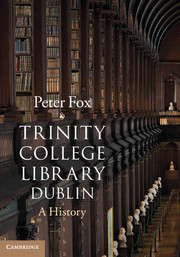Book contents
- Frontmatter
- Dedication
- Contents
- List of illustrations
- List of tables
- Acknowledgements
- Abbreviations
- Introduction
- 1 Early days: 1592–1640
- 2 Ussher, Kells and Durrow: 1641–1665
- 3 Alexander, Bath and the Jacobites: 1666–1708
- 4 A new building: 1709–1737
- 5 Stearne, Gilbert and Lyon: 1738–1749
- 6 The Library in 1750
- 7 Leland to Barrett: 1751–1800
- 8 Fagel: 1798–1809
- 9 Barrett: 1801–1821
- 10 Sadleir, Wall and Todd: 1822–1851
- 11 The Library in 1850
- 12 Todd as Librarian: 1852–1869
- 13 Malet and Ingram: 1869–1886
- 14 Abbott: 1887–1913
- 15 Smyly: 1914–1948
- 16 The Library in 1950
- 17 Parke: 1949–1965
- 18 Professional management: 1965–1983
- 19 Epilogue: 1984–2003
- Appendix 1 Librarians, Assistant Librarians and Deputy Librarians1
- Appendix 2 Growth of the collection
- Appendix 3 The Library oath and declaration
- Sources and select bibliography
- Index of Trinity College Dublin manuscripts
- General index
- Plate Section
- References
8 - Fagel: 1798–1809
Published online by Cambridge University Press: 05 June 2014
- Frontmatter
- Dedication
- Contents
- List of illustrations
- List of tables
- Acknowledgements
- Abbreviations
- Introduction
- 1 Early days: 1592–1640
- 2 Ussher, Kells and Durrow: 1641–1665
- 3 Alexander, Bath and the Jacobites: 1666–1708
- 4 A new building: 1709–1737
- 5 Stearne, Gilbert and Lyon: 1738–1749
- 6 The Library in 1750
- 7 Leland to Barrett: 1751–1800
- 8 Fagel: 1798–1809
- 9 Barrett: 1801–1821
- 10 Sadleir, Wall and Todd: 1822–1851
- 11 The Library in 1850
- 12 Todd as Librarian: 1852–1869
- 13 Malet and Ingram: 1869–1886
- 14 Abbott: 1887–1913
- 15 Smyly: 1914–1948
- 16 The Library in 1950
- 17 Parke: 1949–1965
- 18 Professional management: 1965–1983
- 19 Epilogue: 1984–2003
- Appendix 1 Librarians, Assistant Librarians and Deputy Librarians1
- Appendix 2 Growth of the collection
- Appendix 3 The Library oath and declaration
- Sources and select bibliography
- Index of Trinity College Dublin manuscripts
- General index
- Plate Section
- References
Summary
The granting of legal-deposit status in 1801 and the arrival of the Fagel collection the following year transformed the Library both in size and status. The impact of the legal-deposit legislation would be a gradual one; the impact of acquiring the Fagel library, on the other hand, was immediate. The size of the College Library was increased by about 40 per cent at a stroke, and a collection that was essentially secular in nature and continental in origin was added to a library that had grown over the previous two centuries principally on the basis of books acquired by or for Protestant clergy.
The process of buying the Fagel collection began formally on 31 May 1798, when the governors of the Erasmus Smith Schools, meeting in the Committee Room of the Irish House of Lords, decided ‘that the surplus money now in hand belonging to the Charity may be well applied in purchasing the library of the Greffier Faghel of The Hague, for the use of Trinity College’.
- Type
- Chapter
- Information
- Trinity College Library DublinA History, pp. 115 - 128Publisher: Cambridge University PressPrint publication year: 2014



